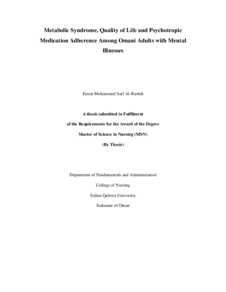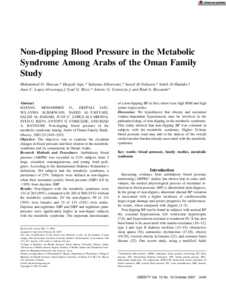وثيقة
Metabolic syndrome, quality of life and psychotropic medication adherence among Omani adults with mental illnesses.
المصدر
Master's thesis
عناوين أخرى
متلازمة التمثيل الغذائي، جودة الحياة ومدى الإلتزام بالأدوية النفسية بين البالغين العمانيين المشخصين بأمراض نفسية
الدولة
Oman
مكان النشر
Muscat
الناشر
Sultan Qaboos University
ميلادي
2023
اللغة
الأنجليزية
نوع الرسالة الجامعية
Master's thesis
الملخص الإنجليزي
Background: Mental illnesses are among the leading causes of disability worldwide.
Individuals with severe mental illnesses were reported to have a significant reduction in
life expectancy and mortality rate by two to three folds compared to the general population.
However, adults with mental illnesses are at higher risk of developing metabolic changes
such as obesity, hypertension, dyslipidemia and hyperglycemia. The inability or failure to
diagnose metabolic syndrome among the mentally ill population promptly has dire
consequences, which include the development of other co-morbidities and decreased life
span with a substantial financial burden. Despite the importance of this topic, very few
researches were conducted in the Arab Gulf Cooperation Council about the prevalence and
associated factors of metabolic syndrome among mentally ill patients and none in Oman.
Purpose: This study was conducted to assess the prevalence of metabolic syndrome among
Omani adults with mental illnesses and explore the associated factors of the metabolic
syndrome.
Methods: A descriptive cross-sectional design was used to identify the prevalence and
associated factors of metabolic syndrome among Omani adults with mental illnesses (n=
251) in two tertiary hospitals at the outpatient department at Sultan Qaboos University
Hospital and Al Masarra- Hospital in Muscat, Sultanate of Oman using a convenience
sampling technique. Data were collected using the World Health Organization Quality of
Life questionnaire (WHOQOL-BREF) to assess the quality of life. The proportion of days
covered (PDC) and the Medication Adherence Rating Scale (MARS) was also used to
measure patients' medication adherence. Moreover, the Godin Shephard Leisure-Time
Physical Activity Questionnaire (GSLTPAQ) measures the physical activity level of
patients.
Descriptive analysis including the mean, standard deviation, frequency and percentages
used to describe the sample characteristics. Correlational analyses and binary logistic
regression analyses were also conducted.
Results: The overall prevalence of metabolic syndrome was found as follows, 29.9%,
30.3% and 33.1% based on Modified Adult Treatment Panel III-A (ATP III-A) criteria,
International Diabetes Federation (IDF) criteria and the Joint statement of IDF Task Force
with other organizations criteria respectively. The regression analysis showed that being
on anti-diabetic medication, larger waist circumference size and higher triglyceride blood
level positively predicted metabolic syndrome, while activity level negatively predicted the
metabolic syndrome.
Conclusion: Findings of this study can be utilized by policymakers and relevant authorities
to develop policies and establish screening protocols for metabolic syndrome among
individuals with mental illnesses. Additionally, these findings can contribute to developing
screening and prevention strategies to mitigate the negative consequences of metabolic
syndrome and improve the overall quality of life for this population.
الملخص العربي
أظهرت نتائج الدراسات أن الأفراد الذين يعانون من أمراض نفسية شديدة بأن لديهم انخفاض ملحوظ في متوسط العمر وارتفاع معدل الوفيات بنسبة تتراوح ما بين ضعفين إلى ثلاثة أضعاف مقارنة بباقي الأفراد. ويتعرض البالغون الذين يعانون من أمراض نفسية لمخاطر أعلى في الإصابة بمتغيرات التمثيل الغذائي مثل السمنة زارتفاع ضغط الدم واضطرابات الدهون وارتفاع مستوى السكر في الدم.
قالب العنصر
الرسائل والأطروحات الجامعية



